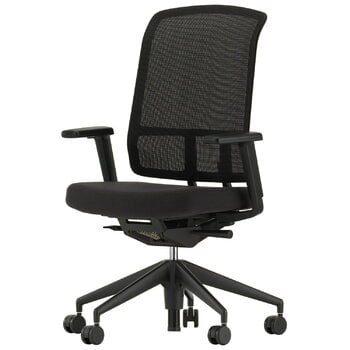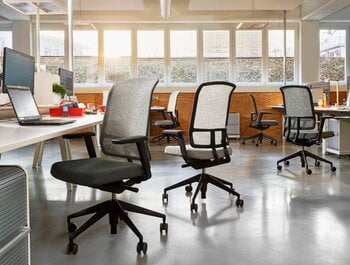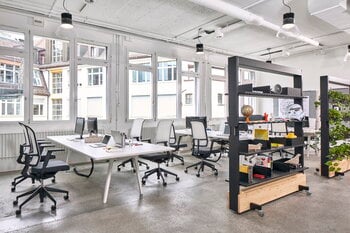Vitra’s AM Chair is the perfect combination of elegance and functionality: skilled engineering, stylish design and decades of experience in office ergonomics. Alberto Meda designed the slender AM Chair to be used at permanent desks, but due to the perfectly padded seat, weight-responsive ProMotion mechanism and ergonomically shaped backrest the chair offers a high level of immediate comfort for workstations with frequently changing users. By adjusting the seat and backrest height and seat depth as well as the height and width of the armrests, the chair can be fine-tuned and personalised to fit the respective user’s needs.
AM Chair task chair, LightNet 01 - Plano 66
Vitra
Description
Vitra’s AM Chair is the perfect combination of elegance and functionality: skilled engineering, stylish design and decades of experience in office ergonomics. Alberto Meda designed the slender AM Chair to be used at permanent desks, but due to the perfectly padded seat, weight-responsive ProMotion mechanism and ergonomically shaped backrest the chair offers a high level of immediate comfort for workstations with frequently changing users. By adjusting the seat and backrest height and seat depth as well as the height and width of the armrests, the chair can be fine-tuned and personalised to fit the respective user’s needs.
Product details (13)
- Colour
- Black
- Width
- 64–70.5 cm
- Measurement details
- Width: seat 49.5 cm
- Depth
- 53.5–82.5 cm
- Height
- 100–120 cm
- Seat depth
- 40–45 cm
- Seat height
- 40–52 cm
- Frame material
- Polyamide
- Seat cushion
- Polyurethane foam
- Upholstery fabric
- Mesh backrest: LightNet 01: 60% polyamide, 40% polyester; Seat: Plano 66: 100% polyester
- Abrasion resistance
- LightNet: 100 000 / Plano: 80 000 Martindale
- Base material
- Polyamide
- Notes
- 2D armrests with adjustable height and width
Designer
Alberto Meda (b. 1945) is an Italian designer, who worked in the 1970s as technical manager of Kartell, and started his freelance career in 1979. Meda has worked with many well-known brands such as Phillips, Alessi and Cinelli, and collaborared also with the Finnish ceramics brand Arabia. Meda has a background in engineering, and his designs are often characterized by a pragmaric mind and fine attention to details. Meda has been awarded with the Compasso d'oro for the Lola and Metropoli lamps designed for the Italian brand Luceplan, and his Water jug for Arabia won Chicago Athenaeum’s Good Design Award.
View all productsReviews (0)
Chat to us online
Please enable functional cookies to use this feature. You can change your cookie settings at any time.







